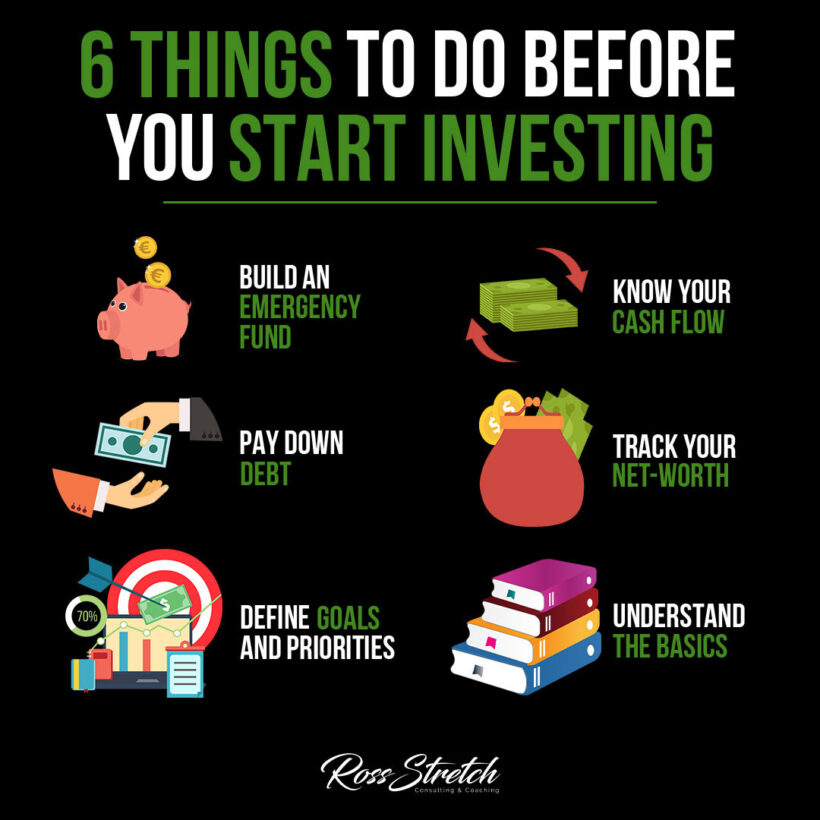Investing can be a great way to grow your wealth, but it’s important to start on the right foot. Jumping into investments without a plan can lead to mistakes. Here are six key steps to take before you start investing. These steps will help you build a strong foundation and make better financial decisions.
1. Build an Emergency Fund
An emergency fund is money set aside for unexpected expenses. This fund acts as a safety net if you lose your job, have a medical emergency, or face an unexpected bill. Most experts recommend having at least three to six months of expenses saved.
- Why It Matters: Investing carries risk, and you don’t want to pull money out of investments to cover emergencies.
- Tip: Keep this money in a safe place, like a savings account, where it’s easy to access if needed.
With an emergency fund in place, you’ll feel more secure when you start investing.
2. Know Your Cash Flow
Understanding your cash flow means knowing how much money comes in and how much goes out each month. This includes your income, bills, and other expenses. Tracking your cash flow helps you see how much money you can afford to invest.
- Why It Matters: Knowing your cash flow prevents you from investing money you’ll need for other expenses.
- Tip: Use a budgeting app or spreadsheet to track your income and spending.
When you understand your cash flow, you can set a realistic budget for investing.
3. Pay Down Debt
High-interest debt, like credit card debt, can be a big drain on your finances. Paying it down before you start investing is a smart move. Many types of debt have interest rates higher than the return you’d earn from most investments.
- Why It Matters: Paying off high-interest debt gives you a guaranteed return by saving on interest.
- Tip: Focus on paying off high-interest debt first, then work on lower-interest debt.
Clearing debt will give you more freedom with your money and reduce financial stress.
4. Track Your Net Worth
Your net worth is the total value of your assets (like savings, property, and investments) minus your liabilities (like debt). Tracking your net worth over time gives you a clear picture of your financial health.
- Why It Matters: Knowing your net worth helps you see where you stand financially and how much you can invest.
- Tip: Recalculate your net worth every few months to track your progress.
Tracking net worth gives you a big-picture view of your finances and motivates you to grow your wealth.
5. Define Goals and Priorities
Setting clear financial goals helps you stay focused. Think about what you want to achieve with your investments. Are you saving for retirement, a house, or a major purchase? Define both your short-term and long-term goals.
- Why It Matters: Goals guide your investment choices and keep you on track.
- Tip: Write down your goals and break them into smaller steps.
When you know your goals, you can create an investment plan that aligns with your priorities.
6. Understand the Basics
Investing has its own terms and concepts, so it’s important to learn the basics. Understand terms like stocks, bonds, and mutual funds. Learn about risk and how different investments perform over time.
- Why It Matters: Knowing the basics reduces the risk of mistakes and helps you make informed choices.
- Tip: Read beginner investing books or take an online course to build your knowledge.
Starting with a solid foundation of knowledge makes it easier to understand and choose the right investments.
Conclusion
Before you start investing, take these six steps to set yourself up for success. Building an emergency fund, managing cash flow, and reducing debt all help create a solid foundation. Setting clear goals and learning the basics will guide you on the right path. By preparing well, you’ll make smarter choices and avoid common investing mistakes.


